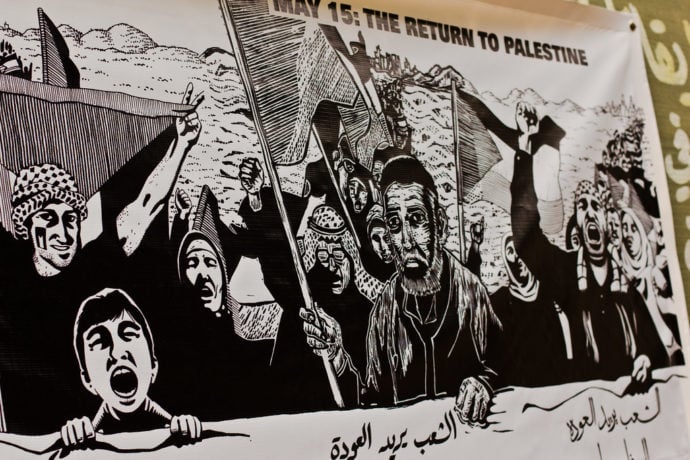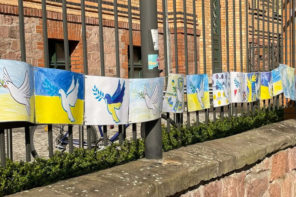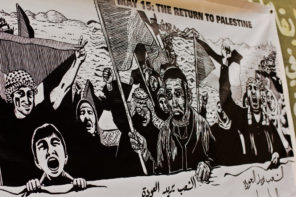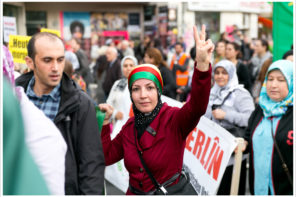German Foreign Minister and Green party member Annalena Baerbock announced on the 23rd of October that Germany will not support a ceasefire as demanded by the EU – even though a humanitarian catastrophe is imminent in Gaza. Meanwhile, many German cities prohibit demonstrations in solidarity with Palestinians. Schools in Berlin forbade students from carrying Palestinian flags as well as the traditional Palestinian scarf keffiyeh. People are getting arrested and beaten up by the police when demonstrating for Gaza. All of this happens in the name of Holocaust memory culture and Germany’s commitment to ‘Never again’. As we collectively witness the televised genocide of Palestinian people, legitimate and urgent questions arise: Have Germans learned nothing from their history? How can Germans – out of everyone – allow, support, and celebrate another genocide after the Holocaust?
Looking at the way Holocaust memory culture is constructed in Germany, and to a lesser extent in other Western societies, I argue that German support for the genocide of Palestinians does not happen despite the Holocaust memory culture, but because of it. The belief that the Holocaust is a unique phenomenon is particularly well entrenched in Germany.
In 1988, philosopher Alan Rosenberg wrote about the difference between ‘knowing’ and ‘understanding’ the Holocaust in the following terms:
“Knowing […] refers to factual information or the process by which it is gathered. Understanding, on the other hand, refers to systematically grasping the significance of an event in such a way that it becomes integrated into one’s moral and intellectual life. Understanding the Holocaust in this sense would radically change how one experiences and acts in the world.”
According to Rosenberg, the belief in the Holocaust’s uniqueness does not allow for comparison – which is a necessary method to gain understanding about a phenomenon. According to Dirk Moses, the uniqueness thesis has become a dogmatic belief in German Holocaust memory culture. A recent illustration of this was a silencing campaign launched in 2020 against Achille Mbembe. The Cameroonian academic Mbembe was accused of relativising the Holocaust and, consequently, of antisemitism due to his efforts to identify the commonalities between colonialism, the Holocaust, and present-day violence and imperialism.
While German memory culture upholds its performative commitment to ‘never again’, it prohibits and punishes genuine attempts to uncover and understand the patterns and mechanisms underlying the Holocaust and other forms of violence, genocide, and oppression.
Rosenberg’s argument, according to which dogmas like the uniqueness thesis ‘block further inquiry’ to understanding how the Holocaust was possible, and, in turn, how to prevent more genocides, proves to be an accurate prediction. While German memory culture upholds its performative commitment to ‘never again’, it prohibits and punishes genuine attempts to uncover and understand the patterns and mechanisms underlying the Holocaust and other forms of violence, genocide, and oppression.
The impact of the uniqueness thesis reaches even further. With the attempt to frame the Holocaust as unique, the Holocaust was reduced to a solely Jewish experience, excluding not only the other victims of Nazi Germany but also its application to future genocides against non-Jewish people. This thinking creates a hierarchy of suffering and victimhood in which Jewish suffering, embodied in the state of Israel, eternally trumps the suffering of others. Consequently, unconditional support for Israel promises Germans to absolve themselves from their inherited guilt and crimes. It is for this reason that Germany cannot accept Palestinians as victims of Israeli colonisation and thus, denies the reality of power asymmetries on the ground. Rather, Palestinians are branded as the real antisemites, and therefore deserving deportation “on a large scale” to use the words of chancellor Olaf Scholz as reported in the Spiegel. This conveniently ignores that 90% of antisemitic attacks in Germany are committed by right-wing groups and individuals.
It is through the very position as the colonised Other that Palestinians become a particular threat to the German narrative. This is because the lived experiences of Palestinians shine a light on the fragility of Germany’s absolution narrative. They make clear that Germany has not overcome its racist past – but is deeply involved with the colonisation, oppression, and elimination of another people. When Scholz met with Israeli president Netanyahu to emphasise the ongoing and unconditional German support for Israeli attacks on Gaza, the latter stated: “this is our shared struggle – the struggle of civilisation against barbarism.” This colonial language, quite typical for Zionism, reveals the continuous present of colonial patterns of thought in German society. Once again, the uniqueness narrative is at play: by insisting on the singularity, out-of-time-and-space-ness of the Holocaust, Germany refuses to acknowledge its own colonial crimes and their connection to the Holocaust. Hence, the slogan ‘never again’ reveals and sustains colonial and racist structures as, for colonised subjects, the violence and genocide have never actually stopped.
Not only does German memory culture preclude a full comprehension of the Holocaust that would enable the drawing of necessary lessons to prevent further genocides, but it also reveals that the underlying racist and colonial structures that made the Holocaust possible are still present in German society today.
Germany’s complicity in the genocide against Palestinians shows that German society has not “radically change[d] how [it] experiences and acts in the world.” Not only does German memory culture preclude a full comprehension of the Holocaust that would enable the drawing of necessary lessons to prevent further genocides, but it also reveals that the underlying racist and colonial structures that made the Holocaust possible are still in place in German society today. Holocaust memory, therefore, serves as a performative act that creates the illusion of German rectification but is far from being “integrated into [Germany’s] moral and intellectual life”.









Yes, yes and yes! Excellent piece.
I live in Germany, have done for a few years, drawn by what I thought were Germany”s post ’45 credentials.
How wrong I’ve recently discovered that move to be, and how disillusioned I’ve become. i’ve spent entire weekends writing and emailing German politicos with either zero recognition or thinly veiled abuse in return. The propaganda is stifling – It really is a parallel universe, as you rather more eloquently point out.
Above all, the utter dishonesty here is for me the most dispiriting – report after report of increasing antisemitism here, but not one politician , not one media outlet – nowhere is the question posed: Why? Why is antisemitism on the rise, and why now? What are the causes, is there a link? .. They dare not, and therein lies the national deceit.